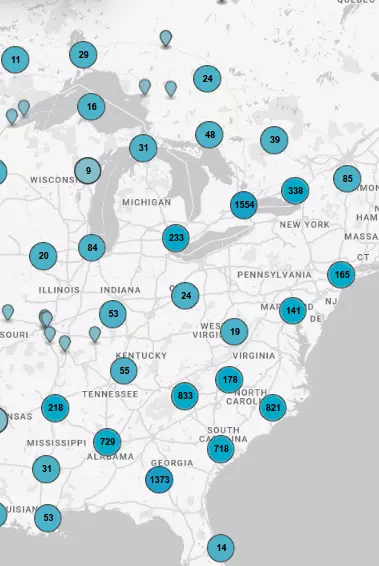Ontario Boundary Dispute
When the Province of Ontario was established in 1867, no defined boundary separated it from the Hudson's Bay Company lands to the north and west. Canada's acquisition of these lands in 1869...
- toronto
- ontario
- alan brown
Old Hay Bay Church
This simple church, built in 1792 by United Empire Loyalists, recalls the early days of Upper Canadian settlement. The Methodists' evangelical zeal was expressed not only in religious practice but...
- toronto
- ontario
- alan brown
The Ontario School for the Blind
In 1869, on the recommendation of the Rev. Egerton Ryerson, Superintendent of Education, funds were allocated to establish the first provincial school for blind children. The Ontario Institution...
- toronto
- ontario
- alan brown
"The Old Mail Road"
For some years prior to the by-law which established it as a public road in 1846, this route had been travelled by settlers destined for the newly-opened townships of Osprey,...
- toronto
- ontario
- alan brown
Old Town Hall
Constructed in 1851-52 this building was for over a hundred years the centre of the municipal and social life of Woodstock. It housed the local government and also served at various times...
- toronto
- ontario
- alan brown
Otterville African Methodist Episcopal Church and Cemetery
Encouraged by local Quakers, free Blacks and escaped slaves fled persecution in the United States and found homes in the Otterville area beginning in 1829. As skilled tradespeople and farmers,...
- toronto
- ontario
- alan brown
Old Stone Mill
The first mill on this site was built about 1796 by Abel Stevens, a loyalist and early industrialist from Vermont. After 1800 the property passed to a member of a prominent local family, William...
- toronto
- ontario
- alan brown
Ontario's First Gold Mine
In August, 1866, Marcus Herbert Powell, Clerk of the Division Court and part-time prospector, struck gold nearby on the farm of John Richardson. The following year Ontario's first gold mine...
- toronto
- ontario
- alan brown
Ontario Ladies' College
Opened in 1874 by the Governor-General, Lord Dufferin, the Ontario Ladies' College was established in "Trafalgar Castle", former residence of Nelson Gilbert Reynolds, Sheriff of Ontario County....
- toronto
- ontario
- alan brown
The Old Welland Canal
Originally conceived in 1818 by its promoter, William Hamilton Merritt, to divert trade from the Erie Canal and New York and built under private auspices, the canal was opened to traffic in...
- toronto
- ontario
- alan brown
The Ontario Northland Railway
In 1900 the Ontario Government ordered a survey for a railway from North Bay to the head of Lake Timiskaming to encourage settlement and provide access to mineral deposits. Construction of...
- toronto
- ontario
- alan brown
The Opeongo Road
This was one of the "colonization roads" authorized by the Province of Canada in an attempt to open up the districts lying inland from the settled townships. Surveyed in 1852 by Robert Bell,...
- toronto
- ontario
- alan brown
Old Trinity 1842-1881
The first Anglican church in Lambton was built on this site 1841-42 and, for many years, its bright tin steeple served as a guide to mariners on the St. Clair River. The land was donated by...
- toronto
- ontario
- alan brown
The Old Stone Church
This building, constructed between 1840 and 1853 by the congregation of St. Andrew's, is remarkable for its beauty and excellent state of preservation. The aesthetic appeal of this...
- toronto
- ontario
- alan brown
Ottawa Teachers' College
The Ottawa Teachers' College, or Normal School, designed by the architect W. R. Strickland and built in 1875 by J. Forin, was the second institution of its type to be established in Ontario. The...
- toronto
- ontario
- alan brown
Oronhyatekha (Peter Martin) (1841-1907)
A distinguished philanthropist, Oronhyatekha transformed the Independent Order of Foresters (IOF) into a successful fraternal organization which saw to the well-being of its members and came to...
- toronto
- ontario
- alan brown
The "Outlaw" Bridge
The first bridge across the Pigeon River was opened near here August 18, 1917. In the previous year the government of Ontario had completed a road from Port Arthur to link up with one which the...
- toronto
- ontario
- alan brown
Oscar Douglas Skelton 1878-1941
Born in Orangeville, Ontario, Skelton attended Queen's University and was a professor there from 1907 until 1924, publishing in that time many books and articles on Canadian history, economics and...
- toronto
- ontario
- alan brown
Ontario Veterinary College 1862
This college, known until 1869 as the Upper Canada Veterinary School, was the first in Canada to offer courses in veterinary medicine. It was established in Toronto in 1862 by the Board...
- toronto
- ontario
- alan brown
Otto Julius Klotz 1852-1923
Born at Preston, Upper Canada, and educated at Toronto and Michigan Universities, Klotz joined the public service in 1879. For thirty years he was engaged in topographical surveys in...
- toronto
- ontario
- alan brown
